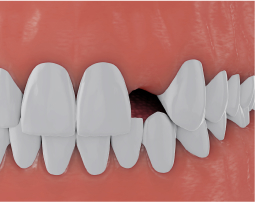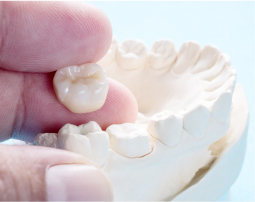A root canal also called endodontics therapy treats teeth that have become severely damaged, allowing the nerves and soft inner pulp of the tooth to become infected. At Ascent Family Dental our general dentists may also recommend a root canal if a tooth has become so damaged or decayed that future infection appears inevitable. Most root canal procedures can take place at our office, however in certain situations, a tooth may need a specialized procedure that would be done with an Endodontist. In this case, our team at Ascent Family Dental would handle referring you to a trusted Endodontic office to have this completed.
Root canals have a reputation for being painful, but modern endodontic techniques and anesthetics make the procedure no more uncomfortable than having a tooth filled. After completing the root canal, the tooth will also need a crown or filling to complete the restoration.
Because it spares at least part of the natural tooth, root canals are often the preferred way of handling significant damage to a tooth.
An extraction followed by bridgework or an implant is an alternative, but any replacement of a tooth may need maintenance after a number of years. A root canal procedure can ensure that the affected tooth lasts a lifetime.
Signs And Symptoms For Possible Root Canal Therapy:
- An abscess (or pimple) on the gums.
- Sensitivity to hot and cold.
- Severe toothache pain.
- Sometimes no symptoms are present.
- Swelling and/or tenderness.
Reasons For Root Canal Therapy:
- Decay has reached the tooth pulp (the living tissue inside the tooth).
- Infection or abscess have developed inside the tooth or at the root tip.
- Injury or trauma to the tooth.
What Does Root Canal Therapy Involve?
A root canal procedure requires one or more appointments depending on the difficulty of the case and severity of infection. Before performing any procedure, your dentist will look at X-rays of your mouth to determine the best course of treatment for you. Antibiotics are usually prescribed to calm the infection before a root canal is performed.
While the tooth is numb, a rubber dam (a sheet of rubber) will be placed around the tooth to keep it dry and free of saliva. An access opening is made on top of the tooth and a series of root canal files are placed into the opening, one at a time, removing the pulp, nerve tissue, and bacteria. If tooth decay is present, it will also be removed with special dental instruments.
Once the tooth is thoroughly cleaned the roots and the inside cavity of the tooth will be filled and sealed with special dental materials. A filling will be placed to cover the opening on top of the tooth. In addition, all teeth that have root canal treatment should have a crown (cap) placed. This will protect the tooth and prevent it from breaking, and restore it to its full function.
After treatment, your tooth may still be sensitive, but this will subside as the inflammation diminishes and the tooth has healed.
You will be given care instructions after each appointment. Good oral hygiene practices and regular dental visits will aid in the life of your root canal treatment.
Who Needs A Root Canal?
Your enamel normally protects your teeth, but any major breach in it could necessitate a root canal. Teeth affected by advanced tooth decay or large cavities may need a root canal before any other restoration can take place. Severe damage to a tooth due to an accident or injury can also lead to a root canal. A large crack or break allows pathogens to invade the nerves and pulp deep inside the tooth, and many dentists recommend a root canal to avoid this painful condition.
Root Canal Symptoms
Some symptoms indicate that you may need a root canal, so tell your dentist about the following warning signs.
- Frequent tooth and gum pain
- A large visible cavity that compromises the integrity of the tooth
- Extreme sensitivity to heat, cold, and pressure
- A foul taste or odor near the afflicted tooth even after brushing your teeth
- Pus that drains into your mouth
- Swollen lymph nodes in your neck and jaw near the affected tooth
- An abscess, or an enclosed pocket of infection that has reached the jaw bone, can cause severe pain and may need emergency treatment before a root canal can take place.
Not all abscesses cause extreme pain, but they still need prompt attention. Tell your dentist about any unexplained swelling or inflammation in your mouth or along your gums.
Video
Steps To Prevent Future Root Canal Procedures
Although a root canal procedure is not generally painful, avoiding major dental work is always preferable. You can minimize your chances of undergoing a root canal procedure in the future by following good oral hygiene practices and paying close attention to your dental health.
- Brush and floss regularly.
- Have your teeth cleaned at least twice a year.
- Wear protective mouth gear while playing sports to reduce chances of injury.
- Have the integrity of any fillings or dental restoration checked during dental visits.
Improve your oral health with Ascent Family Dentistry
Dental Solutions For You

Are you missing a tooh?

I have a broken tooth. Help!

I want to feel confident about my smile.

I’m in pain. What do I do?

My snoring is keeping everyone awake!

I have questions about dentures. Can you help?

But I’m afraid to visit a dentist!

My gums are bleeding. Something’s not right!

